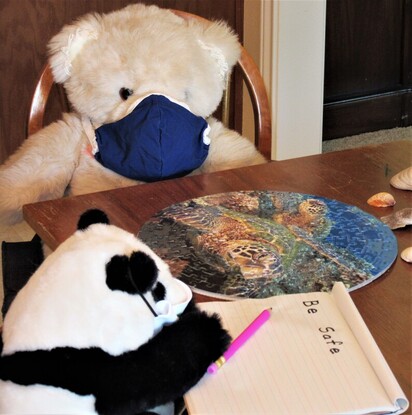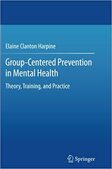 Yes, you can work just fine while wearing a mask.
Yes, you can work just fine while wearing a mask. As I have stated before, social media is mostly gossip and contains very few facts. Therefore, let's search for the truth.
Do Masks Make It Hard to Breathe?
Some people feel as if it is difficult to breathe when wearing a mask, and they therefore assume that it is the mask that is causing them to have trouble breathing. When in fact, it is simply their psychological perception that they're having trouble breathing. Masks do not interfere with breathing. As Christopher Ewing, a lung specialist from Alberta, Canada, explained,
“Most of us aren’t used to wearing face masks, and the sensation of having a mask on your face might make someone anxious or uncomfortable. [a person’s breathing] … can also be influenced by the mind….” [for example] “…when we’re feeling discomfort, even subconsciously, it can change the way we breathe.”
I personally have allergy-induced asthma. I walk for three hours for exercise and even sing while I walk. (I’m a terrible singer, but no one can hear me outside—thank goodness.) The point is that, yes, you can wear a mask and it will not interfere with your exercise or your daily activities. If I'm inside a public building all day, I wear an N-95 mask all day. When I walk, I wear an N-95 mask while I walk. A mask covering your mouth and nose does not interfere with your ability to breathe.
Do Masks Cause Carbon Dioxide Poisoning?
As to the fear of carbon dioxide poisoning, Dr. Minh Quang Nghi, part of Texas Health Physicians Group, explains that even when we breathe without a mask, we are breathing a small amount of CO2 back into our lungs. It’s part of the normal process of breathing. It’s not harmful.
“Everyone rebreathes a small amount of their own CO2 with each breath…. Exhaled air, although containing some CO2, still contains a good amount of breathable air. …a mask would not trap enough in the measured level of CO2 to cause a clinically significant change [poisoning].”
So, no, wearing a mask does not cause you to have trouble breathing or cause carbon dioxide poisoning. That’s just gossip off the Internet from people trying to get you not to wear a mask.
Always question what you read or hear. Check the facts. Each time I write, I give you links and encourage you to go and read the research and articles that I’m quoting. Both of these doctors were quoted on Healthline, a good, reliable medical site, not a political site trying to get you to vote for a particular candidate.
Evaluate the experts. Is the expert you are reading politically motivated? One doctor, who spread lies on the Internet about masks causing carbon dioxide poisoning, even had his license revoked. So, be careful when turning to social media, especially politically sponsored sites.
Two experts are not enough. Let’s also look at the research.
What Does Research Tell Us?
Dr. Michael Campos, a pulmonologist at Miami VA Medical Center and University of Miami Hospital went one step further and tested the belief that masks do not make it hard to breathe. Dr. Campos conducted research comparing fifteen healthy participants and fifteen military veterans. The veterans all had severe chronic obstructive pulmonary disease (COPD) with lung function below 50 percent. Each participant in the study wore a face mask for 30 minutes, walked with a mask on for 6 minutes, and then took a blood test. The blood tests showed that there was no change in oxygen or CO2 levels after wearing a mask or exercising.
Dr. Campos did find from his research though, that
“the discomfort some people feel using a mask is due to anxiety, claustrophobia, or even a neurological response to hotter than normal air touching the face, all of which can cause a ‘perceived difficulty in breathing.’”
So, the panic sensation that you are feeling about your ability to breathe when wearing a mask is merely psychological. As a psychologist, I can also state that yes, you can cause yourself to have difficulty breathing just because you are anti-mask or have a fear of wearing a mask. This is true for children as well as for adults. Children are heavily influenced by parents. Therefore, if you are anti-mask, then your child will have more trouble adjusting to and wearing a mask at school. Children often follow the behavior of adults.
One of the first steps you can take in helping someone to overcome this feeling of anxiety about wearing a mask is to explain the facts—wearing a mask does not make it difficult for you to breathe. With children, you might also go on to explain that many adults wear a mask as part of their job.
Even before COVID-19, surgeons wore tight-fitting masks all day long to protect their patients. Emergency room doctors and nurses are wearing tight fitting masks, and, in some cases, face shields all day to protect themselves from COVID-19. Day after day, even in the doctor’s office, doctors and nurses wear masks to protect themselves from those who come in infected with COVID-19. Children and teachers also need to wear masks to protect themselves from COVID-19 in the classroom.
Some people try to say, but “it's different with children.” Again, go to the experts. Dr. Dickinson and Dr. Guilbert with “Mask Mythbusters” do an excellent job answering questions from parents. I encourage you to go and read their list of questions and answers. They say that masks do not make it harder for children to breathe and do not cause carbon dioxide poisoning. They go one step further and clarify that masks also do not restrict children’s lung development.
For More Information: Do Mask Mandates Cause Psychological or Medical Problems for Children in School?
With all the evidence presented, some parents are still asking, are you sure that I shouldn’t apply for a mask exemption for my child for school?
There are few if any reasons for children to have a mask exemption. Dr. Raed Dweik, MD, a pulmonologist and the chair of Cleveland Clinic’s Respiratory Institute, answered this very question.
“At the Respiratory Institute, we’ve taken the position that there is virtually no circumstance that warrants an exemption from wearing a mask based on lung disease. Many patients with significant respiratory issues are able to wear masks without difficulty. Even patients on the lung transplant waiting list who arguably have the severest forms of advanced lung disease are able to wear masks. If they can do it, anybody can. As for CO2 retention, I have not seen any evidence for it with any mask type, including N95 masks. It certainly does not apply to cloth masks or any masks that do not provide a tight seal.”
So, stop listening to the scare campaigns on social media. Masks do not harm children, and yes, children and teachers can wear masks safely all day at school.
Notice that we are not checking with politicians or the gossips on social media. Breathing is a medical question; therefore, we will turn only to medical experts. I have also chosen experts who are not a part of the political scene. Yes, everyone is entitled to their opinion, but for a medical question, I want a medical answer. As I have said before, when your child is sick, you do not take them down to the governor’s office for medical care. Therefore, I will turn to politicians for political questions and to medical experts for medical questions.
Listen to “real” experts. Protect your child from COVID-19. Wear a mask.
For More Information: Coronavirus Is Raging Through the Schools. We Must Have Mask and Vaccine Mandates to Protect the Children.

For more about psychological perceptions, see Chapter 6 in my book, Group-Centered Prevention in Mental Health.
 RSS Feed
RSS Feed
